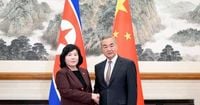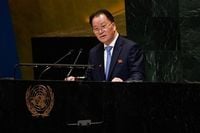North Korea and China have reaffirmed their longstanding alliance in a series of high-level diplomatic meetings, vowing to deepen cooperation and jointly oppose what they call "hegemonism" and "unilateralism." The renewed emphasis on bilateral ties comes at a moment of shifting power dynamics in Northeast Asia, with both countries signaling their intent to present a unified front against perceived U.S. influence in the region.
On Sunday, September 28, 2025, North Korea's Foreign Minister Choe Son-hui met with Chinese top diplomat Wang Yi in Beijing. According to Pyongyang's state-run Korean Central News Agency (KCNA), Choe underscored North Korean leader Kim Jong-un's commitment to strengthening ties with China, calling the relationship the North's "unwavering position." This message was echoed by Wang Yi, who, as reported by China's Xinhua News Agency, reaffirmed Beijing's opposition to "all forms of hegemonism" and called for expanded "strategic communications" and exchanges with Pyongyang.
During the talks, Choe also stated that North Korea stands ready to deepen cooperation with China in global forums, push back against "unilateralism" and great-power coercion, and advocate for a fairer world order. This language, widely interpreted by observers as a thinly veiled critique of U.S. foreign policy, reflects the growing alignment between Beijing and Pyongyang on key international issues.
The weekend meeting was not an isolated event but the latest in a flurry of diplomatic activity between the two neighbors. On Monday, September 29, Choe met with Chinese Premier Li Qiang, marking her second official trip to China in less than a month. KCNA reported that Li told Choe China "highly valued the relations with North Korea" and reaffirmed Beijing's intention to promote bilateral ties from a "strategic and long-term perspective." According to KCNA, Choe delivered a message from Kim Jong-un that the bilateral relationship "is unchanging and should develop to meet the demands of the times," a sentiment shaped by the recent summit between Kim and Chinese President Xi Jinping on the sidelines of a massive Beijing military parade.
That parade, which took place just three weeks prior, was notable for the presence of not only Kim and Xi but also Russian President Vladimir Putin. The gathering of these three leaders was widely interpreted as a display of solidarity and a signal of an emerging partnership of resistance against Washington. KCNA claimed that North Korea and China reached "complete consensus" on international and regional issues during Choe's visit, though China's Xinhua described the outcome more cautiously as a "deep exchange of views on matters of mutual concern."
This subtle difference in emphasis has not gone unnoticed. South Korea's Unification Ministry spokesperson Koo Byoung-sam remarked at a press briefing that "there appears to be a slight difference" between North Korea's and China's accounts of the meeting. Koo pointed out that while North Korea emphasized consensus, China focused on the depth of the discussion, suggesting a nuanced divergence in priorities or messaging.
Yang Moo-jin, an honorary professor at the University of North Korean Studies in Seoul, offered further analysis, noting that North Korea placed particular emphasis on economic exchanges and cooperation—including food aid, tourism, and the creation of a joint economic cooperation committee. Yang also highlighted North Korea's affirmation of its nuclear weapons status and criticism of United Nations sanctions. He speculated that the meeting likely touched on North Korea's policy toward Washington and the possible resumption of dialogue with the U.S., with Pyongyang expected to push for arms control talks under its self-declared nuclear weapons status. North Korea is also likely to demand the suspension of joint U.S.-South Korea military drills and the withdrawal of American strategic assets from the region, measures that would dovetail with China's own regional security interests.
Choe's second visit to China within a month underscores Pyongyang's renewed emphasis on cultivating ties with Beijing, even as it deepens military cooperation with Moscow. The timing of these engagements has fueled speculation that President Xi Jinping may visit Pyongyang in October 2025 to mark the 80th anniversary of the Workers' Party of Korea—a celebration expected to feature a North Korean military parade showcasing new weapons aimed at the U.S. and its allies.
Despite the public display of unity, the relationship between China and North Korea has historically been complex and sometimes strained. While the two countries are traditional allies, their interests do not always align perfectly. As reported by Reuters, China, one of five permanent members of the United Nations Security Council, has supported international efforts to curb Pyongyang's nuclear weapons development. However, Beijing also sees North Korea as a strategic buffer against U.S. influence in East Asia—a view shared by many regional experts.
This delicate balancing act was on display at the United Nations, where North Korean Vice Foreign Minister Kim Son Gyong declared that the country "would never give up its nuclear program." For its part, China has consistently called for dialogue and restraint, seeking to avoid instability on its border while also resisting what it perceives as American attempts to dominate regional security arrangements.
Li Qiang, China's premier, emphasized that the bilateral ties have been "further cemented under the direct attention and strategic guidance of the two leaders." This sentiment was echoed in both countries' official statements, which repeatedly referenced the "strategic and long-term perspective" guiding their partnership.
Still, the alliance is not without its challenges. North Korea's pursuit of nuclear weapons remains a source of international tension and complicates China's efforts to present itself as a responsible global power. Yet, the current diplomatic choreography suggests that both sides see value in closer coordination—at least for now.
Observers are watching closely to see whether the recent flurry of diplomatic activity will translate into concrete changes, either in North Korea's approach to negotiations with the U.S. or in China's willingness to support tougher international measures. For now, the message from Beijing and Pyongyang is clear: their alliance is not only intact but being actively reinforced in response to a rapidly changing world.
As the 80th anniversary of the Workers' Party of Korea approaches, all eyes are on Pyongyang and Beijing. Whether the celebrations will be accompanied by further diplomatic or military developments remains to be seen, but one thing is certain—the relationship between North Korea and China is once again at the center of Northeast Asian geopolitics.


